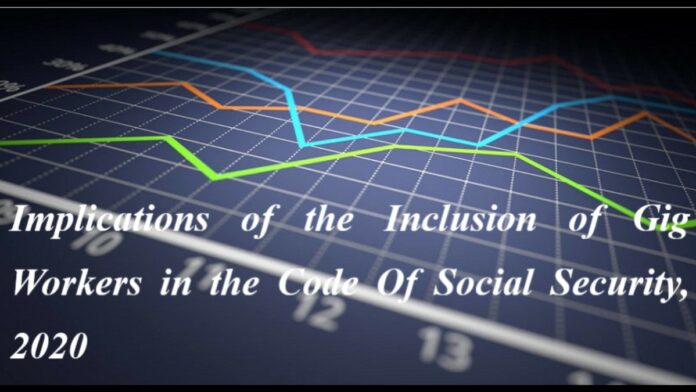
Recently, the Code on Social Security was drafted to amalgamate nine labour laws. Seeing the ever-widening ambit of the gig economy, it became necessary for gig workers and platform workers’ inclusion in the code on social security, to put an end to the grievances. The code on social security covers workers in both organized and unorganized sectors. It defines both gig workers and platform workers and makes India, the first country to include digital platform workers under its legislative ambit.
This Code isn’t simply a compilation of previous laws rolled into one. It has broadened coverage, made benefits available to all workers in both the organized and unorganised sectors, incorporated concepts of providing maximum benefits with minimal governance, and demonstrated consistency in approach. The Code aims to bring consistency to the provision of social security benefits to employees, which was previously divided into various acts with varying applicability and coverage.
“Gig worker” is defined in the Code as a person who performs work in an arrangement and earns from such activities which are beyond the scope of traditional employer-employee relationships whereas a platform worker is defined as individual engaged or undertaking platform work. This definition has to be studied in light of platform work, which is envisaged in the code as a work arrangement outside of a traditional employer-employee relationship in which organisations or individuals use an online platform to connect with other organisations or individuals to solve specific problems, provide specific services, or engage in any other activities that the Central Government may deem appropriate in exchange for payment.[1]
The above definitions seem to be vague as they fail to acknowledge the diversity of work under these umbrella terms. The gig economy consists of two types of work namely, “crowd-work, which is work executed through online platforms, such as freelance writing, coding, and other technical opportunities, and on-demand work via apps / digital platforms, which is usually traditional work such as transport, cleaning, running errands offered and assigned through mobile apps, undertaken in the real world”. On-demand work through e-platforms is unpredictable as those have barely any standards of service and management, unreliable income sources, with workers facing health risks and safety, sudden mass layoffs.[2]
For example, a food delivery personnel working for an e-platform is not included in the social security benefits and does not constitute an employee. He may come under the ambit of a job seeker as a gig worker, an online platform worker as he got his job through registration with an online platform, and as an unorganised worker too, as he is self-employed. This code in turn does not cater to explicitly state the role of the food delivery boys and other drivers of these e-platforms. It further adds to the complexity.
The Code requires platforms such as Uber, Zomato, Swiggy, and Ola to contribute a portion of their annual revenue (1-2 percent) to provide social security to their platform workers. The contribution should be made by the 30th of June of each year through self-assessment and the submission of a form stating the number of gig workers associated with it at the beginning of each fiscal year. This step is indeed welcoming. The code also involves the construction of a centralized fund financed from numerous sources and backed by tech-enabled processes, that will affect the lives and livelihoods of over 500 million workers, which is in consideration. Workers must register with the fund and receive benefits directly from the fund, while the digital platform, serves as a mediator.[3]
There is, however, a point to catch that while the Indian government appears to acknowledge the need for protection for gig workers by including them in the social security code which takes care of the needs of accidental insurance, old age expenses, creche, maternity benefits, etc. but it fails to provide a reason for not including them in the rules dealing with salaries, occupational safety, or industrial relations.[4] The right of workers to receive decent wages and good working conditions[5] is still left uncertain.
The code also requires registration of Aadhaar cards to attain social security benefits as incorporated in the code, which is against the ruling of the Apex court in K.S. Puttaswamy Vs. Union of India[6], which had eliminated the mandate for registration of the Aadhaar card. It is limited only to schemes funded under the consolidated fund of India and the present scheme is funded by both employer and employees.[7]
[1] Social Security Code 2020
[2] Sneha Visakha, ‘Covid -19 calls for rethinking social security for Indian platform workers’ (Vidhi Centre For Legal Research, 5 August 2020) <https://vidhilegalpolicy.in/blog/covid-19-calls-for-re-thinking-social-security-for-indias-platform-workers/> accessed on 16 October 2021
[3] Sandeep Soni, ‘India’s gig economy comprising Zomato, Swiggy, Ola, Dunzo, others may serve 90m jobs, add 1.25% to GDP’ (Financial Express, 30 March 2021) < https://www.financialexpress.com/industry/sme/indias-gig-economy-comprising-zomato-swiggy-ola-dunzo-others-may-serve-90m-jobs-add-1-25-to-gdp/2223519/> accessed 16 October 2021
[4] Sanvi Bhatia, ‘Can The New Social Security Code Of 2020 Help Solve The Swiggy-Zomato Labour Law Crisis’ (Centre for Labour Laws, NLIU Bhopal, 23 September 2021) <https://cll.nliu.ac.in/can-the-new-social-security-code-of-2020-help-solve-the-swiggy-zomato-labour-law-crisis/> accessed 16 October 2021
[5] Constitution of India, Article 43
[6] Justice K. S. Puttaswamy (Retd.) and Anr. vs Union Of India And Ors AIR 2017 SC 4161
[7] Gopika Mundra, ‘Gig Workers and Platform Workers under the Code on Social Security, 2020: An Analysis’ (25 May 2021) Fast Forward Justice Law Journal <https://fastforwardjustice.com/gig-workers-and-platform-workers-under-the-code-on-social-security-2020-an-analysis/> accessed 16 October 2021





